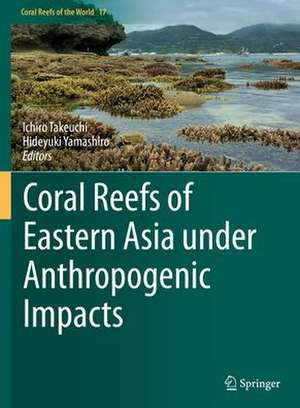Coral Reefs of Eastern Asia under Anthropogenic Impacts: Coral Reefs of the World, cartea 17
Editat de Ichiro Takeuchi, Hideyuki Yamashiroen Limba Engleză Hardback – 26 iun 2023
Din seria Coral Reefs of the World
- 18%
 Preț: 1118.62 lei
Preț: 1118.62 lei - 18%
 Preț: 946.72 lei
Preț: 946.72 lei - 18%
 Preț: 1573.99 lei
Preț: 1573.99 lei - 18%
 Preț: 1240.93 lei
Preț: 1240.93 lei - 24%
 Preț: 1076.16 lei
Preț: 1076.16 lei - 15%
 Preț: 671.48 lei
Preț: 671.48 lei - 15%
 Preț: 658.37 lei
Preț: 658.37 lei - 18%
 Preț: 1696.30 lei
Preț: 1696.30 lei - 18%
 Preț: 1873.10 lei
Preț: 1873.10 lei - 24%
 Preț: 1937.46 lei
Preț: 1937.46 lei - 24%
 Preț: 804.04 lei
Preț: 804.04 lei - 24%
 Preț: 811.65 lei
Preț: 811.65 lei - 24%
 Preț: 697.94 lei
Preț: 697.94 lei - 18%
 Preț: 1124.15 lei
Preț: 1124.15 lei - 24%
 Preț: 643.01 lei
Preț: 643.01 lei - 24%
 Preț: 930.25 lei
Preț: 930.25 lei - 24%
 Preț: 1249.89 lei
Preț: 1249.89 lei
Preț: 1385.37 lei
Preț vechi: 1689.48 lei
-18% Nou
Puncte Express: 2078
Preț estimativ în valută:
265.10€ • 283.47$ • 221.03£
265.10€ • 283.47$ • 221.03£
Carte disponibilă
Livrare economică 27 martie-10 aprilie
Preluare comenzi: 021 569.72.76
Specificații
ISBN-13: 9783031275593
ISBN-10: 3031275594
Pagini: 180
Ilustrații: VII, 180 p. 87 illus., 82 illus. in color.
Dimensiuni: 210 x 279 mm
Greutate: 0.57 kg
Ediția:2023
Editura: Springer International Publishing
Colecția Springer
Seria Coral Reefs of the World
Locul publicării:Cham, Switzerland
ISBN-10: 3031275594
Pagini: 180
Ilustrații: VII, 180 p. 87 illus., 82 illus. in color.
Dimensiuni: 210 x 279 mm
Greutate: 0.57 kg
Ediția:2023
Editura: Springer International Publishing
Colecția Springer
Seria Coral Reefs of the World
Locul publicării:Cham, Switzerland
Cuprins
Chapter 1. Introduction: The Relevance of Anthropogenic Factors to Coral Reef Conservation in the Coastal Areas of the East China Sea.- Chapter 2. Transitional Coral Ecosystem of Taiwan in the Era of Changing Climate.- Chapter 3. Dynamics of Coral Reef Communities in the Sekisei Lagoon, Japan, Following the Severe Mass Bleaching Event of 2016.- Chapter 4. Succession and Emergence of Corals in High-Latitude (Temperate) Areas of Eastern Asia into the Future.- Chapter 5. Succession and Spread of Coral Diseases and Coral-Killing Sponges with Special Reference to Microbes in Southeast Asia and Adjacent Waters.- Chapter 6. Succession of Ocean Acidification and its Effects on Reef-Building Corals.- Chapter 7. Anthropogenic Stresses in Coral Reefs and Adjacent Ecosystems of the East China Sea.- Chapter 8. Development of a Compact Experimental System for Ecotoxicological Experiments on Acropora spp..- Chapter 9. Effects of Anthropogenic Chemicals on Hermatypic Corals with Special Reference to Gene Expression.- Chapter 10. Perspective for the Conservation of Coral Reefs in the East China Sea.
Notă biografică
Ichiro Takeuchi
Since the past 30 years, I have been conducting research in the following subject area: (1) species diversity and ecology of amphipod crustaceans based on fieldwork along the coasts from Antarctica to North America, and (2) the analysis of the distribution of anthropogenic chemicals in shallow-water ecosystems. Understanding how shallow-water ecosystems are changing due to various anthropogenic activities motivated me to study the conservation of the coral reef ecosystem.
Hideyuki Yamashiro
I have been studying corals and coral-associates for 40 years. My recent interests shifted to coral infectious diseases, including the coral-killing sponge, in Japanese coral reefs, where there is a rise in disease occurrence in corals, most of which are associated with global and local environmental disturbances.
Since the past 30 years, I have been conducting research in the following subject area: (1) species diversity and ecology of amphipod crustaceans based on fieldwork along the coasts from Antarctica to North America, and (2) the analysis of the distribution of anthropogenic chemicals in shallow-water ecosystems. Understanding how shallow-water ecosystems are changing due to various anthropogenic activities motivated me to study the conservation of the coral reef ecosystem.
Hideyuki Yamashiro
I have been studying corals and coral-associates for 40 years. My recent interests shifted to coral infectious diseases, including the coral-killing sponge, in Japanese coral reefs, where there is a rise in disease occurrence in corals, most of which are associated with global and local environmental disturbances.
Textul de pe ultima copertă
Coral reefs, which are one of the most productive and biodiverse ecosystems on Earth, serve various important roles, such as providing shelter and spawning grounds to a wide range of marine animals. However, the global decline of hard corals in tropical and subtropical regions is a growing concern. A recent review of the Intergovernmental Panel on Climate Change (IPCC) indicated that only 10%–30% of coral reefs would survive with an increase of 1.5 °C in global warming temperature. Of coral reefs around the world, the coral reefs in eastern Asia face one of the most industrially developed and high population areas in the world. Thus, coral reefs of eastern Asia have been affected by various anthropogenic factors, such as eutrophication, coastal development, anthropogenic pollutants, ocean acidification, disease, and overfishing. Therefore, urgent research is required to determine the levels at which different factors will affect coral health. Besides, we propose a perspective on coralreef (especially those in eastern Asia) conservation under climate change and various anthropogenic activities.
Caracteristici
Review the recent coral reef succession in the eastern Asia Includes recent compact hard coral experiment with generic analysis of coral Present new perspective of coral reef production facing industrially developed area
